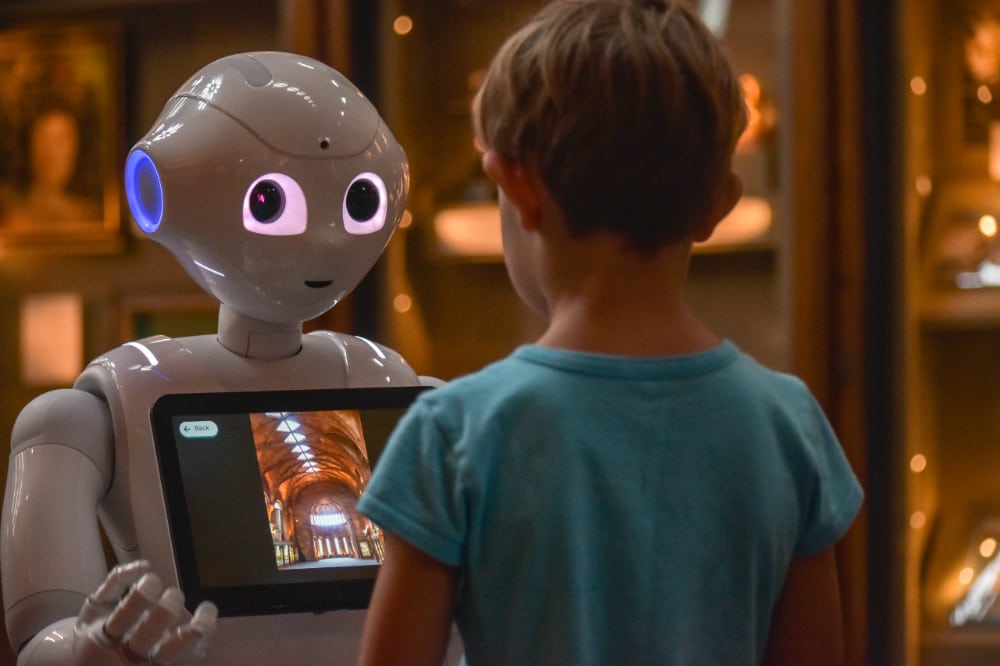
Let me set the stage for the ad. Two parents standing in the door of their son’s room call to him, saying that they have “someone here who wants to meet you,” giving the sense that they are about to show him a puppy or a baby sibling. Instead, the parents “introduce” their son, Riley, to Moxie, a robot “friend.” Throughout the ad, we see Moxie asking Riley questions — about nighttime routines, conversations he had with friends — as well as offering challenges, such as making kind notes for his parents and inviting friends over.
At first glance, you might be surprised at my wariness of a friendly robot. What’s the big deal? From what the video shows, as well as other consumer videos shared on the website — embodied.com — Moxie is all about supporting the social and emotional growth of kids through fun activities and playfulness. That, in and of itself, is not a problem.
In fact, I think the reasons behind Moxie are good. As the website shares, kids are struggling with depression, anxiety, social interaction, etc. It even references different studies and research institutions: from a 2020 Children’s Mental Health Report, 30% of of youth will experience anxiety, yet 80% of that group will go untreated; from the Lurie Children’s Hospital of Chicago, 71% of parents said the pandemic had taken a toll on their child’s mental health; and from the American Academy of Pediatrics, “We are caring for young people with soaring rates of depression, anxiety, trauma, loneliness.” All of this is disturbing and needs to be addressed. But I’m not sure a robot is the answer to our problems.
So, let me share my reservations, which were the same reservations my friends shared with me after they watched the video.
First, while Moxie encourages social interactions, Riley is never shown interacting with any other children. Moreover, it appears that Riley is an only child. Even the consumer photos and videos confirmed this worry: only a few showed more than one child interacting with the robot. Kids are already isolated enough, and while I can see that the creators of Moxie believe this robot will encourage children to form further friendships — and maybe it could — I worry instead that it could become a crutch for isolated kids. Even more, I worry that parents may see it as a replacement for siblings.
Second, while the lessons from Moxie are good ones — how to communicate well, how to handle emotions, etc. — these are lessons that parents should be teaching their kids. As someone who has many friends who are teachers, we are already seeing a trend where too many parents rely on other people and institutions to raise their children. With that trend in mind, I worry that too many parents would rely on Moxie to do their God-given vocation to provide a healthy environment where their kids can learn these important life skills. The website itself even admits that “One of a parent’s most important jobs is to nurture a sense of belonging and resilience in their young kids.” Exactly: It’s a parent’s job, not a robot’s.
Now, I must make a clarification. From the reviews and consumer videos shared on the website, I can see that many children who appear to be of benefit to this product are on the autism spectrum — children who need a little extra love and support to cultivate the skills that come more naturally to most children. If this is an additional resource, I can see it being of help. However, to rely on this as a replacement for friends, siblings and even parents in the lives of any of our children is a mistake. And that’s what worries me about Moxie.
From a Catholic perspective, I find the name behind Embodied Inc., to be an interesting choice. We are embodied souls, and nothing can replace the human-to-human interaction for which we were created. Not even a social robot.
Ava Lalor is associate editor for Our Sunday Visitor and editor for Radiant magazine.





